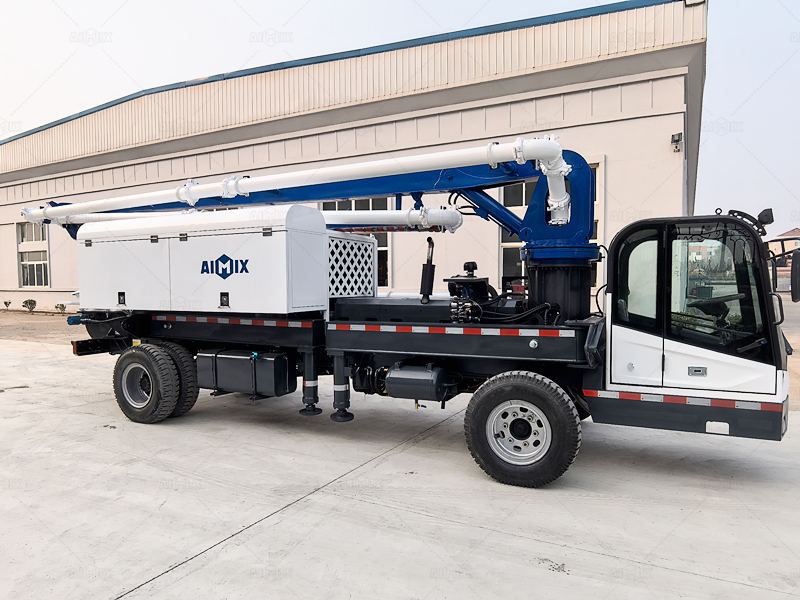Comparing Stationary Concrete Pump from Different Companies
- aimixglobal5
- May 4, 2025
- 4 min read
When investing in a stationary concrete pump, selecting the right equipment from the right concrete pump company is critical to ensure long-term productivity, low maintenance costs, and optimal performance. With various suppliers offering different models across a range of prices and specifications, knowing how to compare stationary concrete pumps from different companies becomes a key skill—especially for contractors and construction firms that rely on consistency, durability, and efficiency in their daily operations.

This guide will walk you through the most important factors to consider when comparing stationary concrete pumps from different companies to help you make a confident and cost-effective purchasing decision.
Pump Performance and Specifications
The core function of a stationary concrete pump is to transport concrete through pipelines to the required location. Therefore, evaluating the technical specifications of the pump is your first step:
Maximum concrete output (m³/h): The volume of concrete the pump can deliver per hour.
Pumping pressure (MPa): Determines how far and how high the concrete can be pumped.
Delivery cylinder diameter and stroke length: Affects pumping capacity and efficiency.
Vertical and horizontal pumping distances: Crucial for multi-story or wide-area projects.
Compare these specifications side-by-side across different models and brands. Some companies may offer pumps with higher pressure and output, which can handle heavier-duty tasks or tougher aggregates.
Power Type and Efficiency
Stationary pumps typically come in two power options—diesel and electric. Depending on your work environment and fuel costs, this choice will affect both upfront and long-term operating costs.
Diesel concrete pumps are better suited for remote sites with no access to electricity.
Electric pumps are often more energy-efficient and require less maintenance but need a stable power source.
Different concrete pump companies will offer one or both options. Be sure to ask about power consumption, efficiency ratings, and noise levels—especially if the worksite is in a regulated urban area.
Pump Structure and Build Quality
The build quality of a stationary concrete pump affects its durability, safety, and lifespan. Inspect key components such as:
Frame and chassis: Is it made from reinforced steel? Is it rust-resistant?
Hydraulic system: Check for reliability, strength, and ease of service.
Wear-resistant parts: Components like S-valves, delivery pipes, and pistons should be built from high-quality materials.
Reputable concrete pump companies will often emphasize durability and may provide certifications or testing reports to prove the structural integrity of their machines.
Brand Reputation and Experience
The longevity and reputation of a concrete pump company matter a lot. Established companies are more likely to offer reliable after-sales service, access to spare parts, and proven designs. When comparing suppliers, ask questions like:
How many years has the company been in the concrete machinery business?
What markets or countries does it serve?
Do they have customer testimonials or project case studies?
A brand with a solid global reputation (or even a strong regional one) is often a safer investment than an unknown startup with no track record.
After-Sales Support and Service Network
One of the most overlooked aspects when comparing stationary concrete pumps is the after-sales service. Even the best pump will need regular servicing or replacement parts during its life cycle. Reliable support includes:
24/7 technical support
On-site maintenance or repair options
Easy access to spare parts
User training or technical documentation
Some companies also offer mobile service vans or regional offices, which can significantly reduce downtime. A concrete pump company with a global or national service network is generally a better choice.
Warranty Terms and Service Contracts
Compare the warranty coverage offered by each company. Standard warranties typically cover 6 months to 2 years depending on the pump and supplier. Key points to review include:
What parts are covered under the warranty?
Does the warranty include labor or only parts?
Are there extended service contracts or preventive maintenance programs available?
These factors will help protect your investment and keep long-term maintenance costs under control.
Price vs. Value
While cost is always a major consideration, you shouldn’t automatically go with the cheapest option. Evaluate the total cost of ownership:
Initial purchase price
Fuel or electricity consumption
Spare parts cost and availability
Expected lifespan
Maintenance needs
Sometimes, a higher-priced stationary concrete pump may offer better durability, longer service intervals, and lower operating costs, making it the more economical choice in the long run.
Customization and Optional Features
Some concrete pump companies offer customizable options to suit specific project requirements. These might include:
Remote-control operation
Smart control panels with diagnostics
Hopper capacity modifications
Cold weather packages for regions like Canada or Russia
If your projects have unique needs, choosing a company that allows for technical customization can be a key advantage.
User Reviews and Site Visits
Ask for references or speak with previous buyers. If possible, visit a nearby site where the pump from a specific supplier is being used. This real-world observation allows you to:
See the pump in action
Talk to operators about reliability
Inspect wear and maintenance habits
Nothing beats feedback from someone using the equipment daily.
Delivery Time and Logistics
Lastly, check how quickly each concrete pump company can deliver the equipment. Ask:
Is the model in stock?
What is the shipping timeline?
Who handles customs clearance (if importing)?
A reliable company will offer a clear delivery schedule and help coordinate logistics to avoid project delays.
Choosing the right stationary concrete pump from a wide range of companies requires a comprehensive approach that goes beyond price tags. From technical performance and energy efficiency to service support and brand reputation, every detail plays a role in the final decision.
By thoroughly comparing these factors, asking the right questions, and focusing on long-term value rather than just upfront cost, you can find a stationary concrete pump that fits your project needs and budget—while also forming a trustworthy partnership with a reputable concrete pump company.





Comments